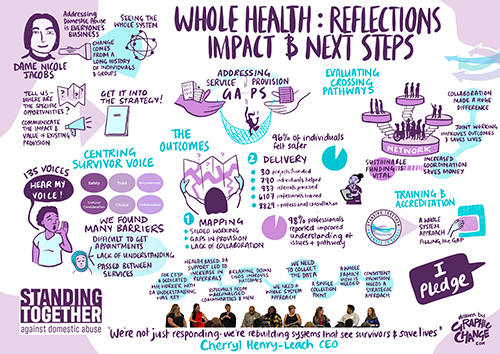Standing Together Against Domestic Abuse
Transforming the way that healthcare professionals respond to domestic abuse
Around 20% of all police-recorded crime is related to violence against women and girls. Yet while healthcare settings were often the first place that victims will seek help, referrals to specialist domestic abuse services from healthcare professionals were low.
 Standing Together Against Domestic Abuse (STADA) saw a need to intervene. Its Whole Health Project has transformed healthcare responses to domestic abuse through systemic interventions, ensuring that victims/survivors receive timely and effective support.
Standing Together Against Domestic Abuse (STADA) saw a need to intervene. Its Whole Health Project has transformed healthcare responses to domestic abuse through systemic interventions, ensuring that victims/survivors receive timely and effective support.
It conducted a comprehensive gaps and incident analysis across England with Integrated Care Boards, NHS trusts and various domestic abuse services, and addressed identified service gaps by embedding an innovative Coordinated Health Response within the NHS.
Through 30 services commissioned by the Home Office, STADA deployed independent domestic violence advocates and domestic abuse coordinators in hospitals, GP practices and maternity wards, and trained clinicians to identify and respond to domestic abuse.
Over the past year, the Whole Health Project project has directly helped the lives of 790 survivors – women, men and children. Through the 30 services, it processed 937 referrals, trained 6,107 healthcare professionals and provided 8,829 instances of professional consultation.
Its programme, which was co-designed with survivors, has transformed the way healthcare professionals respond to domestic abuse, enabling earlier intervention, reducing diagnostic errors and ensuring that survivors are met with empathy and expertise. It is also saving money for the NHS by preventing escalation of problems, and ultimately it saves lives.
Through tailored training programmes, 97% of healthcare professionals reported improved understanding of domestic abuse, and 96% felt more confident in recognising the signs of abuse. One GP said: “This was the most practical and relevant training I’ve ever had. I now see patients in a new light – holistically, not just their symptoms.”
Charity Awards judge Dr Priya Singh, executive director of the Society for Assistance of Medical Families, said STADA had successfully interrogated data to identify gaps in service provision, and addresses the whole environment in which domestic abuse happens and its consequences, rather than simply focusing on the abuse itself.
André Clarke, director of charity development at Lloyds Bank Foundation, said it was a “really strong example of multisectoral working”, and showed what is possible when organisations working in different areas collaborate to address client intersectionalities. “And they were able to demonstrate a clear saving to the NHS.”
Karin Woodley, CEO of Cambridge House, added that “for an organisation of their size to have built those relationships is quite extraordinary”.
CC Reg. no. 1088844

